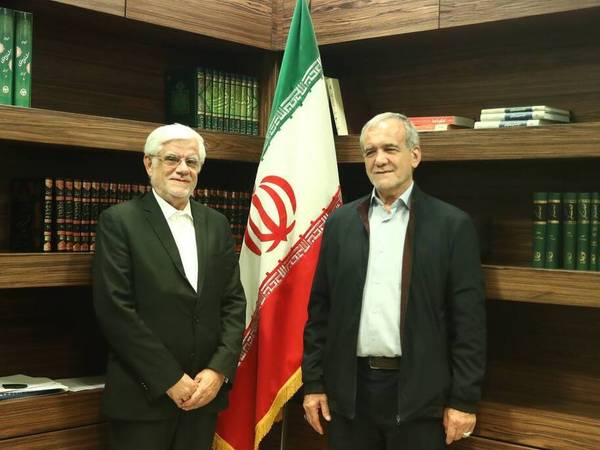Iran’s President Masoud Pezeshkian has appointed Mohammad-Reza Aref, a ‘reformist’ known for his aloof conduct as a lawmaker, as his first vice president, contrary to earlier reports suggesting a top economist would get the post.
The announcement came immediately after Pezeshkian received his seal of approval from Supreme Leader Ali Khamenei during an inauguration ceremony on Sunday morning, officially assuming the position of President.
Aref, who was the leader of the Reformists in parliament between 2016-2020, became known as the “Sultan of silence” after remaining indifferent to major upheavals in the country. Not only he was less than visible in legislative affairs, he failed to rally his faction when government forces quashed anti-regime protests in 2017-2918 and 2019 killing more than 1,500 civilians.
Aref’s inaction as Reform Front’s Chairman was a major reason why ‘reformists’ lost political credibility with the electorate and received only three percent of the vote in the 2021 presidential election. Hardliners who had already purged others in the 2020 parliamentary elections, were able to put Ebrahim Raisi in the presidential office in August 2021. One result of this major takeover of power was the failure of nuclear talks with the West in 2021-2022.
On Saturday, Nameh News, a major new website had reported that Pezeshkian’s choice for vice-president was Ali Tayyebnia, a respected economic official, who was minister during President Hassan Rouhani’s administration. This scenario would mean that Tayyebnia would coordinate all economy-related agencies at a time when to most pressing problem is to partially improve the ailing economy.
Tayyebnia can still be appointed in the cabinet, but the likelihood that he would expect to return to the same position as he held earlier seems less likely. He could also be appointed as vice-president for economic affairs, since president in Iran have several deputies.
By appointing Aref, Pezeshkian has chosen the least problematic ‘reformist’ from his perspective, as well as that of Khamenei. The new president has repeatedly vowed full allegiance to the Supreme Leader’s agenda, despite attempts by many regime insiders to portray him as a reformist himself.
Pezeshkain reiterated his allegiance to Khamenei once again during his inauguration on Sunday, and his religious devotion by lengthy recitations of Quranic verses in Arabic. An Iranian on social media commented that the ceremony sounded more like an inauguration taking place in Saudi Arabia.
The 73-year-old Aref was a revolutionary university student in the 1970s and was arrested by the secret police for his anti-Shah activities. He studied electronics in Tehran University and then continued his studies at Stanford University, where he received a master’s degree and a PhD in electrical and communication engineering in 1980. He represents the generation that many Iranians now derisively call the "79-ers", referring to those who overthrew the monarchy in 1979.
